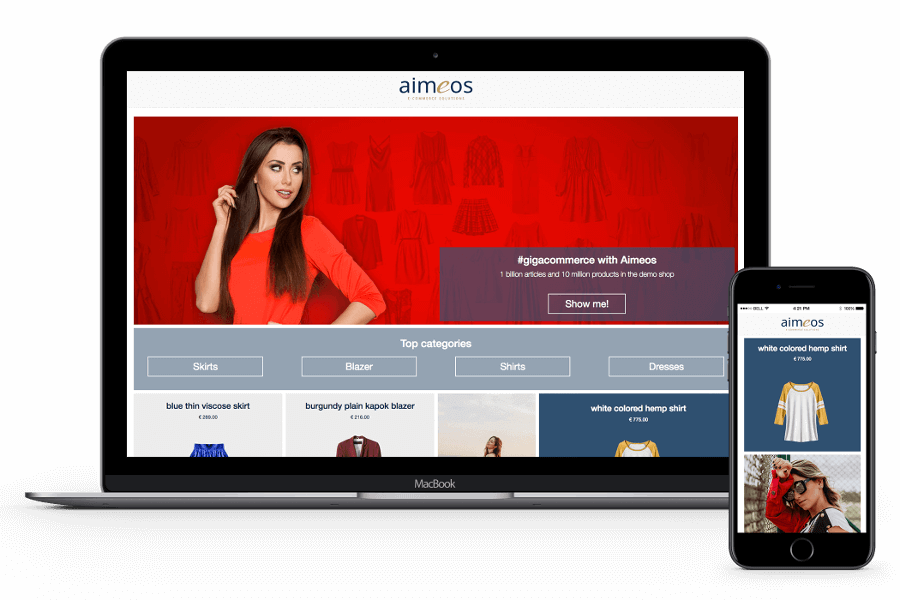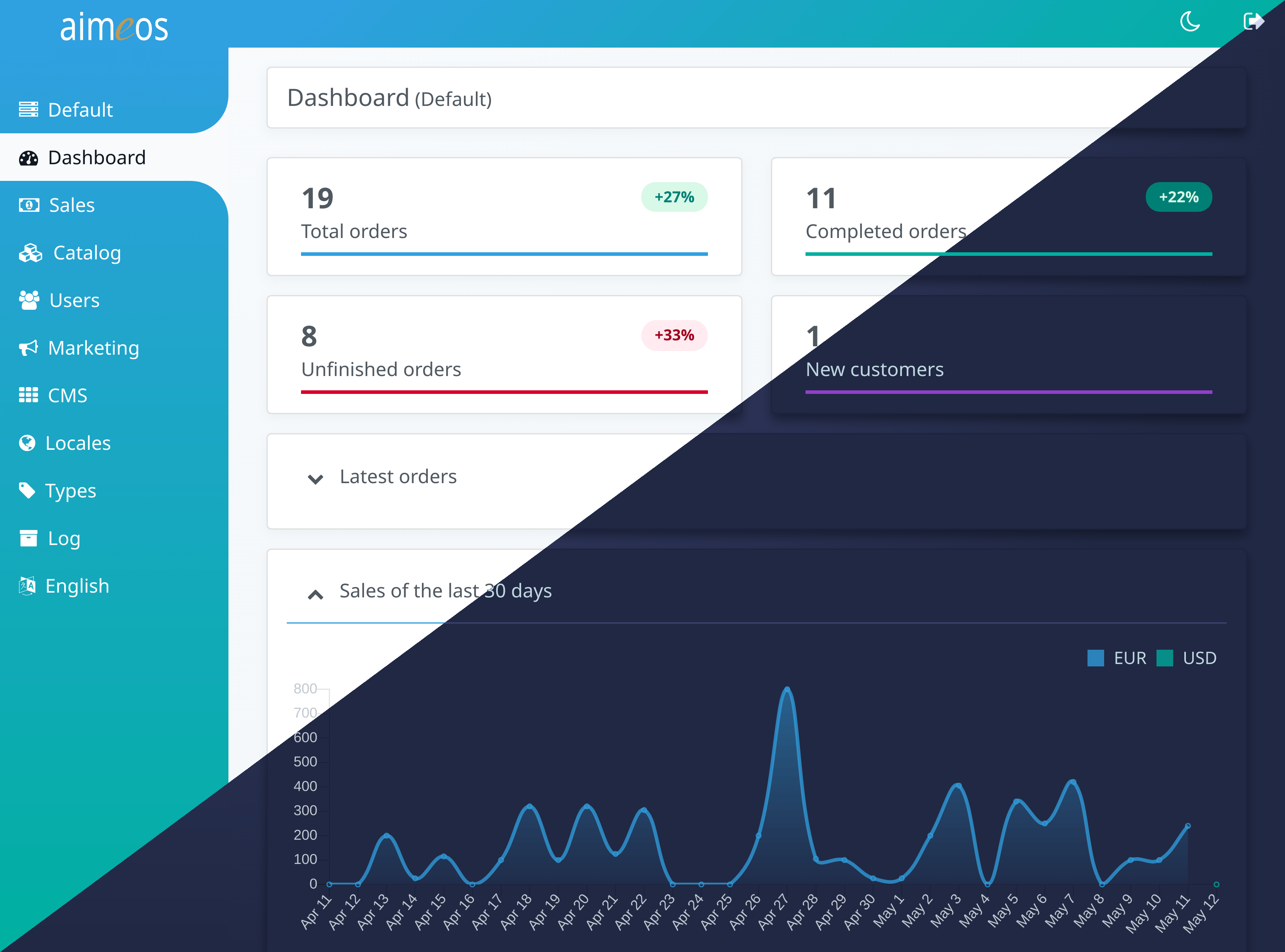
aimeos-laravel
Laravel ecommerce package for ultra fast online shops, scalable marketplaces, complex B2B applications and #gigacommerce
Stars: 7625
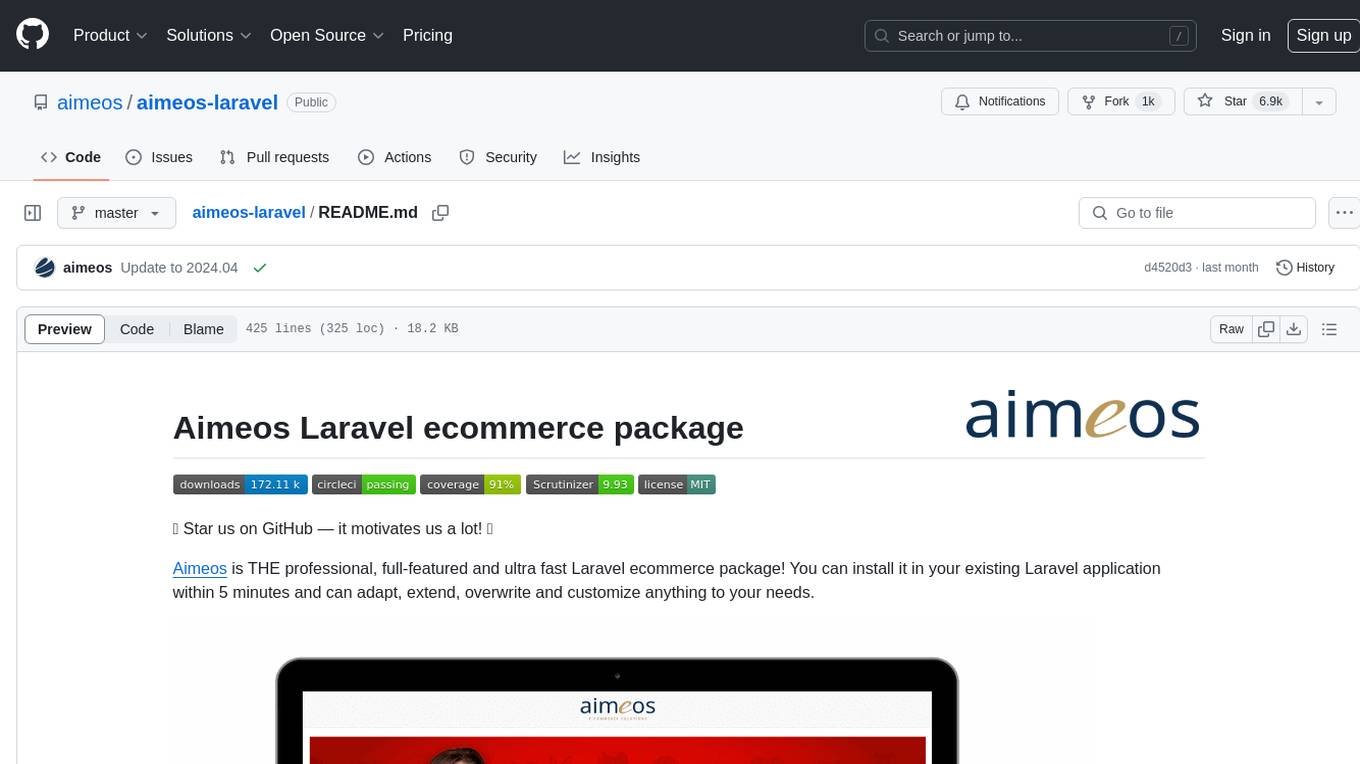
Aimeos Laravel is a professional, full-featured, and ultra-fast Laravel ecommerce package that can be easily integrated into existing Laravel applications. It offers a wide range of features including multi-vendor, multi-channel, and multi-warehouse support, fast performance, support for various product types, subscriptions with recurring payments, multiple payment gateways, full RTL support, flexible pricing options, admin backend, REST and GraphQL APIs, modular structure, SEO optimization, multi-language support, AI-based text translation, mobile optimization, and high-quality source code. The package is highly configurable and extensible, making it suitable for e-commerce SaaS solutions, marketplaces, and online shops with millions of vendors.
README:
⭐ Star us on GitHub — it motivates us a lot! 😀
Aimeos is THE professional, full-featured and ultra fast Laravel ecommerce package! You can install it in your existing Laravel application within 5 minutes and can adapt, extend, overwrite and customize anything to your needs.
Aimeos is a full-featured e-commerce package:
- Multi vendor, multi channel and multi warehouse
- From one to 1,000,000,000+ items
- Extremly fast down to 20ms
- For multi-tentant e-commerce SaaS solutions with unlimited vendors
- Bundles, vouchers, virtual, configurable, custom and event products
- Subscriptions with recurring payments
- 100+ payment gateways
- Full RTL support (frontend and backend)
- Block/tier pricing out of the box
- Extension for customer/group based prices
- Discount and voucher support
- Flexible basket rule system
- Full-featured admin backend
- Beautiful admin dashboard
- Configurable product data sets
- JSON REST API based on jsonapi.org
- GraphQL API for administration
- Completly modular structure
- Extremely configurable and extensible
- Extension for market places with millions of vendors
- Fully SEO optimized including rich snippets
- Translated to 30+ languages
- AI-based text translation
- Optimized for smart phones and tablets
- Secure and reviewed implementation
- High quality source code
... and more Aimeos features
Supported languages:
Check out the demos:
If you want to set up a new application or test Aimeos, we recommend the Aimeos shop distribution. It contains everything for a quick start and you will get a fully working online shop in less than 5 minutes:
If you want to build a single page application (SPA) respectively a progressive web application (PWA) yourself and don't need the Aimeos HTML frontend, then the Aimeos headless distribution is the right choice:
⭐ Aimeos headless distribution
Currently, the Aimeos Laravel packages 2023.10 and later are fully supported:
- LTS release: 2024.10+ (Laravel 10.x and 11.x)
- Old LTS release: 2023.10 (Laravel 9.x, 10.x and 11.x)
If you want to upgrade between major versions, please have a look into the upgrade guide!
The Aimeos shop distribution requires:
- Linux/Unix, WAMP/XAMP or MacOS environment
- PHP >= 8.1
- MySQL >= 5.7.8, MariaDB >= 10.2.2, PostgreSQL 9.6+, SQL Server 2019+
- Web server (Apache, Nginx or integrated PHP web server for testing)
If required PHP extensions are missing, composer will tell you about the missing
dependencies.
If you want to upgrade between major versions, please have a look into the upgrade guide!
Make sure that you've created the database in advance and added the configuration
to the .env file in your application directory. Sometimes, using the .env file makes
problems and you will get exceptions that the connection to the database failed. In that
case, add the database credentials to the resource/db section of your ./config/shop.php
file too!
If you don't have at least MySQL 5.7.8 or MariaDB 10.2.2 installed, you will probably get an error like
Specified key was too long; max key length is 767 bytes
To circumvent this problem, drop the new tables if there have been any created and
change the charset/collation setting in ./config/database.php to these values before
installing Aimeos again:
'connections' => [
'mysql' => [
// ...
'charset' => 'utf8',
'collation' => 'utf8_unicode_ci',
// ...
]
]Caution: Also make sure that your MySQL server creates InnoDB tables by default as MyISAM tables won't work and will result in an foreign key constraint error!
If you want to use a database server other than MySQL, please have a look into the article about supported database servers and their specific configuration. Supported are:
- MySQL, MariaDB (fully)
- PostgreSQL (fully)
- SQL Server (fully)
Make sure, you use one of the supported database servers in your .env file, e.g.:
DB_CONNECTION=mysql
DB_HOST=127.0.0.1
DB_PORT=3306
DB_DATABASE=aimeos
DB_USERNAME=root
DB_PASSWORD=
Caution: The SQLite database configured by default is NOT supported!
The Aimeos Laravel online shop package is a composer based library. It can be installed easiest by using Composer 2.1+ in the root directory of your existing Laravel application:
wget https://getcomposer.org/download/latest-stable/composer.phar -O composer
Then, add these lines to the composer.json of the Laravel skeleton application:
"prefer-stable": true,
"minimum-stability": "dev",
"require": {
"aimeos/aimeos-laravel": "~2024.10",
...
},
"scripts": {
"post-update-cmd": [
"@php artisan vendor:publish --tag=laravel-assets --ansi --force",
"@php artisan vendor:publish --tag=public --ansi",
"\\Aimeos\\Shop\\Composer::join"
],
...
}Afterward, install the Aimeos shop package using
php composer update -W
In the last step, you must now execute these artisan commands to get a working or updated Aimeos installation:
php artisan vendor:publish --tag=config --tag=public
php artisan migrate
php artisan aimeos:setup --option=setup/default/demo:1In a production environment or if you don't want that the demo data gets
installed, leave out the --option=setup/default/demo:1 option.
You have to set up one of Laravel's authentication starter kits. Laravel Breeze is the easiest one but you can also use Jetstream.
composer require laravel/breeze
php artisan breeze:install
npm install && npm run build # if not executed automatically by the previous commandLaravel Breeze will ask you a few questions, the most important one is the type of stack you want to use. Select "Blade" (it's the easiest way) and use the default values for the others.
It also adds a route for /profile to ./routes/web.php which may overwrite the
aimeos_shop_account route. To avoid an exception about a missing aimeos_shop_account
route, change the URL for these lines from ./routes/web.php file from /profile to
/profile/me:
Route::middleware('auth')->group(function () {
Route::get('/profile/me', [ProfileController::class, 'edit'])->name('profile.edit');
Route::patch('/profile/me', [ProfileController::class, 'update'])->name('profile.update');
Route::delete('/profile/me', [ProfileController::class, 'destroy'])->name('profile.destroy');
});For more information, please follow the Laravel documentation:
As a last step, you need to extend the boot() method of your
App\Providers\AppServiceProvider class and add the lines to define how
authorization for "admin" is checked in app/Providers/AppServiceProvider.php:
public function boot()
{
// Keep the lines before
\Illuminate\Support\Facades\Gate::define('admin', function($user, $class, $roles) {
if( isset( $user->superuser ) && $user->superuser ) {
return true;
}
return app( '\Aimeos\Shop\Base\Support' )->checkUserGroup( $user, $roles );
});
}Test if your authentication setup works before you continue. Create an admin account for your Laravel application so you will be able to log into the Aimeos admin interface:
php artisan aimeos:account --super <email>The e-mail address is the user name for login and the account will work for the
frontend too. To protect the new account, the command will ask you for a password.
The same command can create limited accounts by using --admin, --editor or --api
instead of --super (access to everything).
To reference images correctly, you have to adapt your .env file and set the APP_URL
to your real URL, e.g.
APP_URL=http://127.0.0.1:8000
Caution: Make sure, Laravel uses the file session driver in your .env file!
Otherwise, the shopping basket content won't get stored correctly!
SESSION_DRIVER=file
If your ./public directory isn't writable by your web server, you have to create these
directories:
mkdir public/aimeos public/vendor
chmod 777 public/aimeos public/vendor
In a production environment, you should be more specific about the granted permissions!
Then, you should be able to call the catalog list page in your browser. For a quick start, you can use the integrated web server. Simply execute this command in the base directory of your application:
php artisan serve
Point your browser to the list page of the shop using:
- 2024.x+: http://127.0.0.1:8000/shop/search
- 2023.x: http://127.0.0.1:8000/shop
Note: Integrating the Aimeos package adds some routes like /shop or /admin to your
Laravel installation but the home page stays untouched! If you want to add Aimeos to
the home page as well, replace the route for "/" in ./routes/web.php by this line:
Route::group(['middleware' => ['web']], function () {
Route::get('/', '\Aimeos\Shop\Controller\CatalogController@homeAction')->name('aimeos_home');
});For multi-vendor setups, read the article about multiple shops.
This will display the Aimeos catalog home component on the home page you you get a nice looking shop home page which will look like this:
If you've still started the internal PHP web server (php artisan serve)
you should now open this URL in your browser:
Enter the e-mail address and the password of the newly created user and press "Login".
If you don't get redirected to the admin interface (that depends on the authentication
code you've created according to the Laravel documentation), point your browser to the
/admin URL again.
Caution: Make sure that you aren't already logged in as a non-admin user! In this case, login won't work because Laravel requires you to log out first.
To simplify development, you should configure to use no content cache. You can
do this in the config/shop.php file of your Laravel application by adding
these lines at the bottom:
'madmin' => [
'cache' => [
'manager' => [
'name' => 'None',
],
],
],The Aimeos Laravel package is licensed under the terms of the MIT license and is available for free.
For Tasks:
Click tags to check more tools for each tasksFor Jobs:
Alternative AI tools for aimeos-laravel
Similar Open Source Tools

aimeos-laravel
Aimeos Laravel is a professional, full-featured, and ultra-fast Laravel ecommerce package that can be easily integrated into existing Laravel applications. It offers a wide range of features including multi-vendor, multi-channel, and multi-warehouse support, fast performance, support for various product types, subscriptions with recurring payments, multiple payment gateways, full RTL support, flexible pricing options, admin backend, REST and GraphQL APIs, modular structure, SEO optimization, multi-language support, AI-based text translation, mobile optimization, and high-quality source code. The package is highly configurable and extensible, making it suitable for e-commerce SaaS solutions, marketplaces, and online shops with millions of vendors.
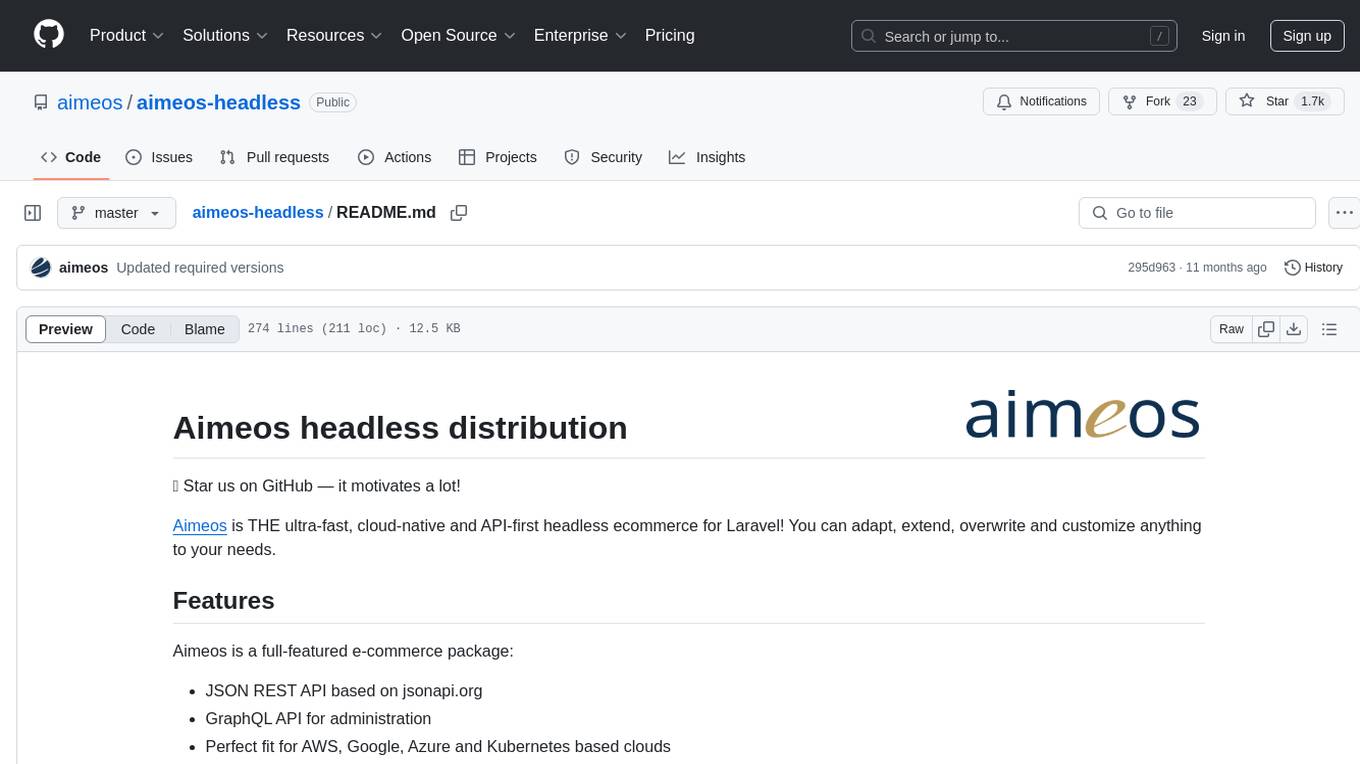
aimeos-headless
Aimeos headless distribution is an ultra-fast, cloud-native, and API-first headless ecommerce solution for Laravel. It offers a full-featured e-commerce package with features like JSON REST API, GraphQL API, multi-vendor support, subscriptions, block/tier pricing, admin backend, and more. The distribution is highly customizable, extensible, and suitable for multi-tenant e-commerce SaaS solutions. It supports multiple languages, AI-based text translation, and provides secure and high-quality source code. Aimeos is designed for AWS, Google, Azure, and Kubernetes based clouds, and can handle a wide range of products efficiently.

refact-lsp
Refact Agent is a small executable written in Rust as part of the Refact Agent project. It lives inside your IDE to keep AST and VecDB indexes up to date, supporting connection graphs between definitions and usages in popular programming languages. It functions as an LSP server, offering code completion, chat functionality, and integration with various tools like browsers, databases, and debuggers. Users can interact with it through a Text UI in the command line.
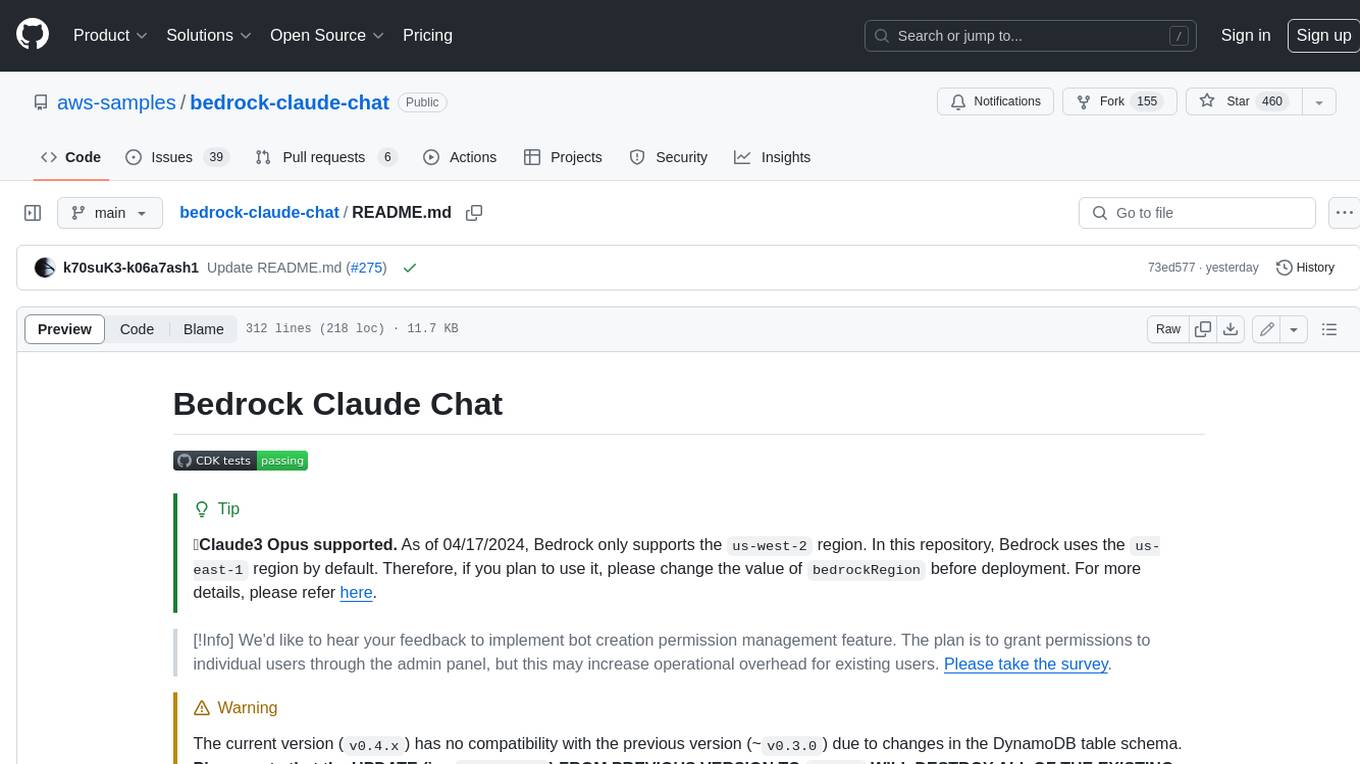
bedrock-claude-chat
This repository is a sample chatbot using the Anthropic company's LLM Claude, one of the foundational models provided by Amazon Bedrock for generative AI. It allows users to have basic conversations with the chatbot, personalize it with their own instructions and external knowledge, and analyze usage for each user/bot on the administrator dashboard. The chatbot supports various languages, including English, Japanese, Korean, Chinese, French, German, and Spanish. Deployment is straightforward and can be done via the command line or by using AWS CDK. The architecture is built on AWS managed services, eliminating the need for infrastructure management and ensuring scalability, reliability, and security.
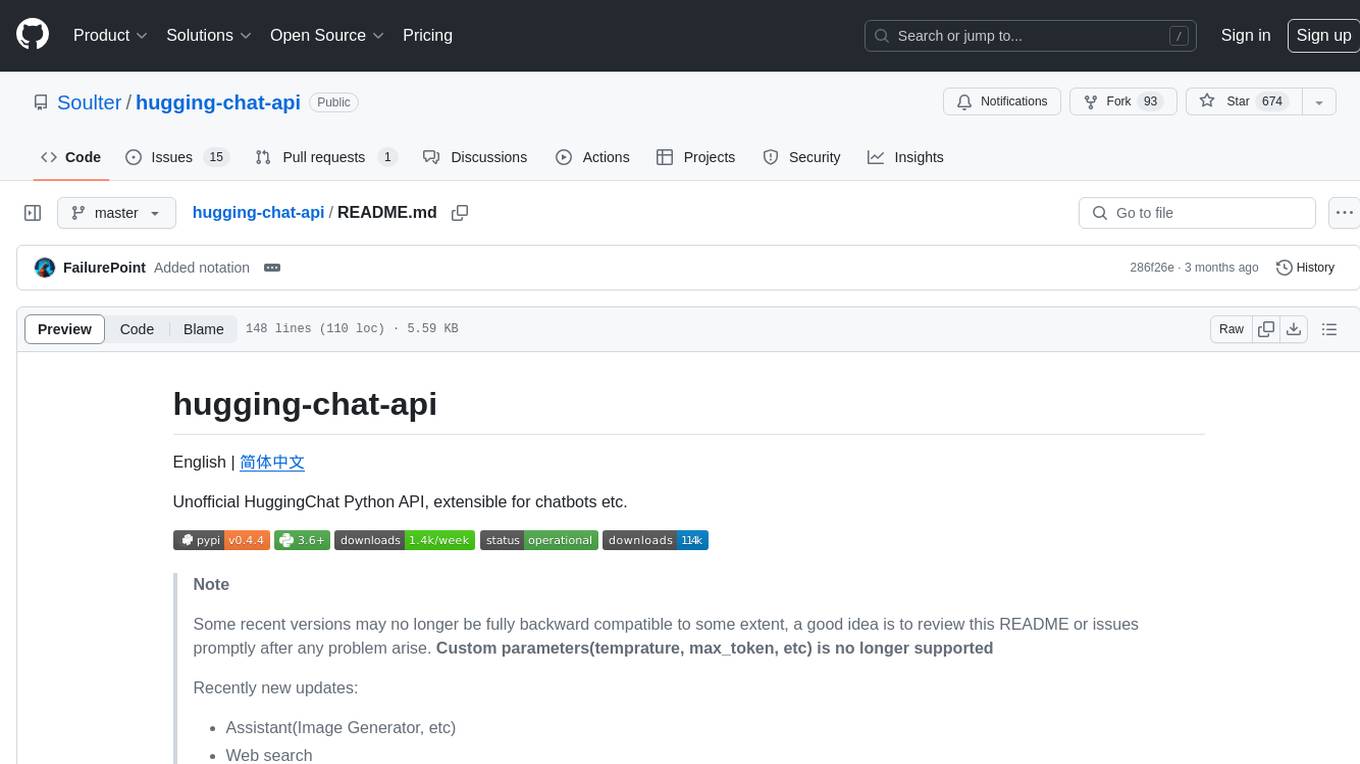
hugging-chat-api
Unofficial HuggingChat Python API for creating chatbots, supporting features like image generation, web search, memorizing context, and changing LLMs. Users can log in, chat with the ChatBot, perform web searches, create new conversations, manage conversations, switch models, get conversation info, use assistants, and delete conversations. The API also includes a CLI mode with various commands for interacting with the tool. Users are advised not to use the application for high-stakes decisions or advice and to avoid high-frequency requests to preserve server resources.
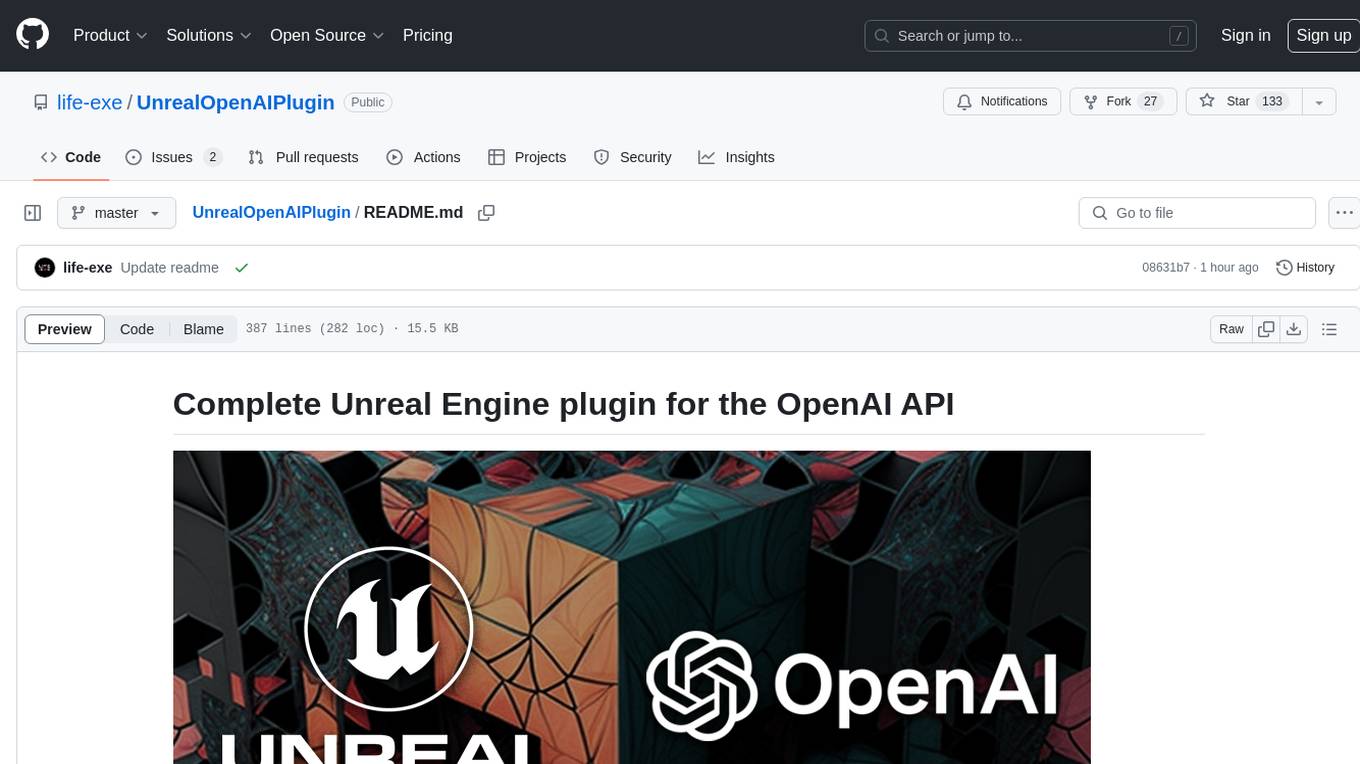
UnrealOpenAIPlugin
UnrealOpenAIPlugin is a comprehensive Unreal Engine wrapper for the OpenAI API, supporting various endpoints such as Models, Completions, Chat, Images, Vision, Embeddings, Speech, Audio, Files, Moderations, Fine-tuning, and Functions. It provides support for both C++ and Blueprints, allowing users to interact with OpenAI services seamlessly within Unreal Engine projects. The plugin also includes tutorials, updates, installation instructions, authentication steps, examples of usage, blueprint nodes overview, C++ examples, plugin structure details, documentation references, tests, packaging guidelines, and limitations. Users can leverage this plugin to integrate powerful AI capabilities into their Unreal Engine projects effortlessly.
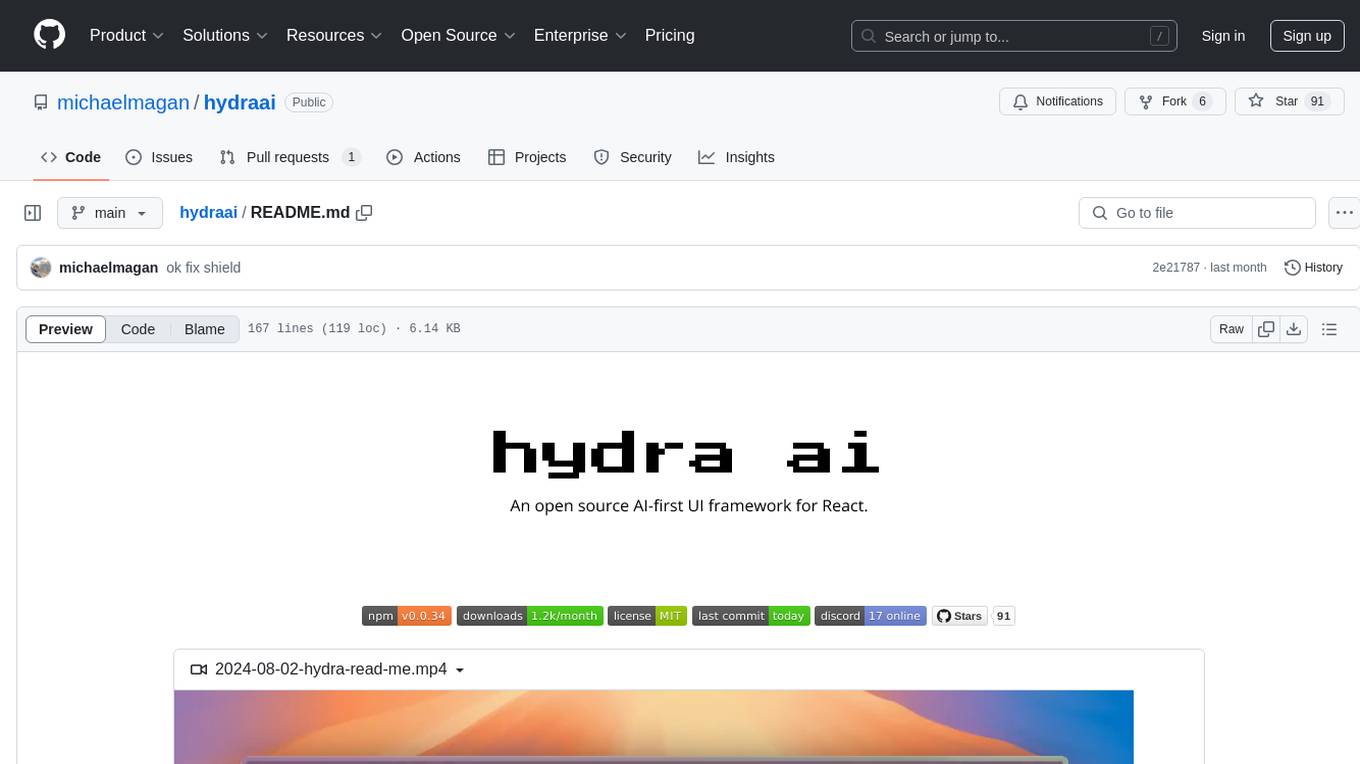
hydraai
Generate React components on-the-fly at runtime using AI. Register your components, and let Hydra choose when to show them in your App. Hydra development is still early, and patterns for different types of components and apps are still being developed. Join the discord to chat with the developers. Expects to be used in a NextJS project. Components that have function props do not work.
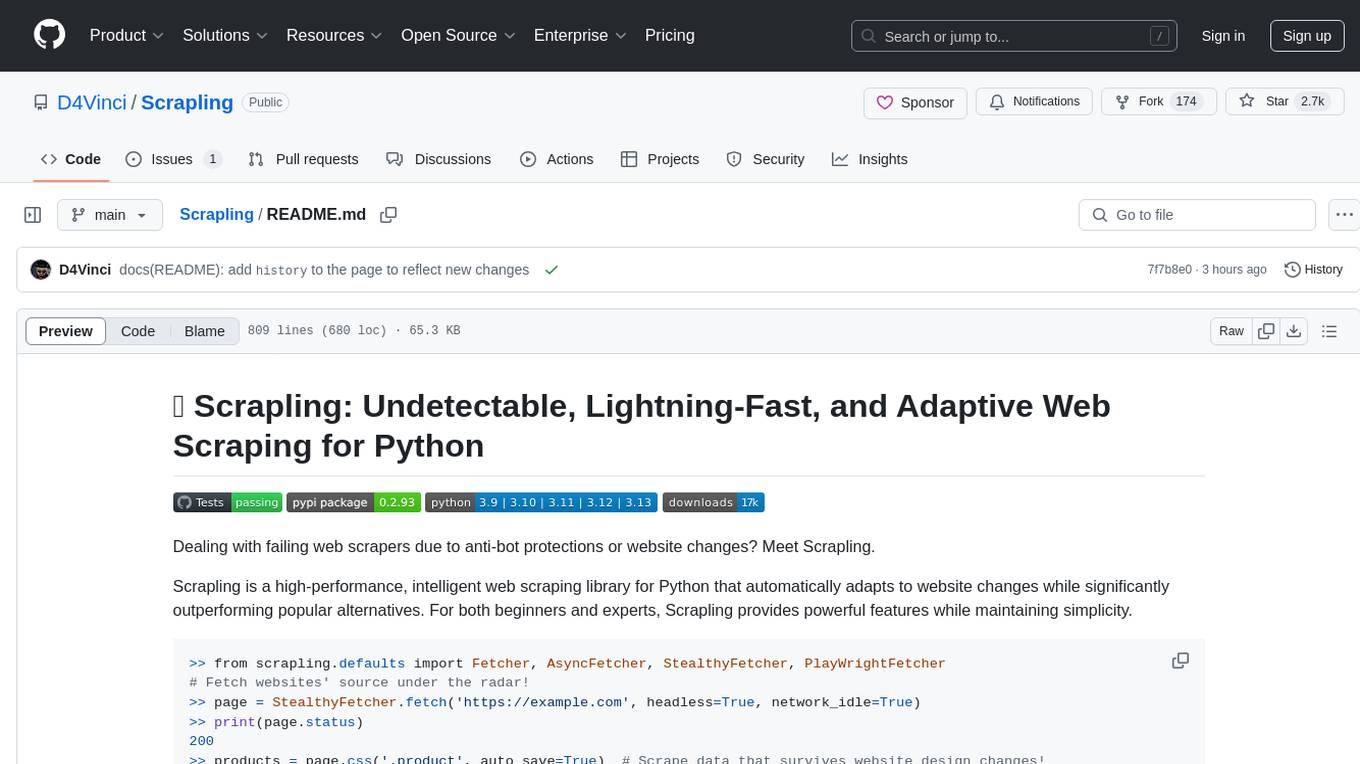
Scrapling
Scrapling is a high-performance, intelligent web scraping library for Python that automatically adapts to website changes while significantly outperforming popular alternatives. For both beginners and experts, Scrapling provides powerful features while maintaining simplicity. It offers features like fast and stealthy HTTP requests, adaptive scraping with smart element tracking and flexible selection, high performance with lightning-fast speed and memory efficiency, and developer-friendly navigation API and rich text processing. It also includes advanced parsing features like smart navigation, content-based selection, handling structural changes, and finding similar elements. Scrapling is designed to handle anti-bot protections and website changes effectively, making it a versatile tool for web scraping tasks.
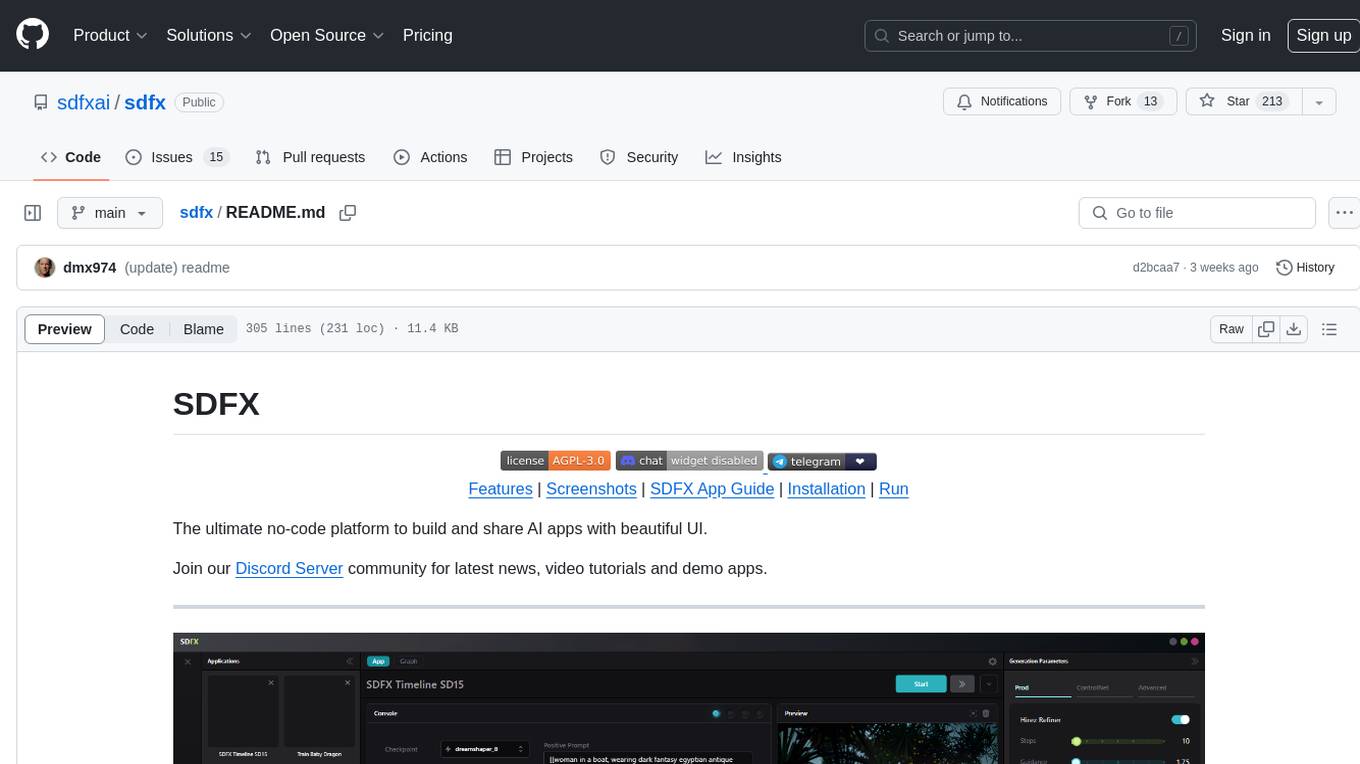
sdfx
SDFX is the ultimate no-code platform for building and sharing AI apps with beautiful UI. It enables the creation of user-friendly interfaces for complex workflows by combining Comfy workflow with a UI. The tool is designed to merge the benefits of form-based UI and graph-node based UI, allowing users to create intricate graphs with a high-level UI overlay. SDFX is fully compatible with ComfyUI, abstracting the need for installing ComfyUI. It offers features like animated graph navigation, node bookmarks, UI debugger, custom nodes manager, app and template export, image and mask editor, and more. The tool compiles as a native app or web app, making it easy to maintain and add new features.
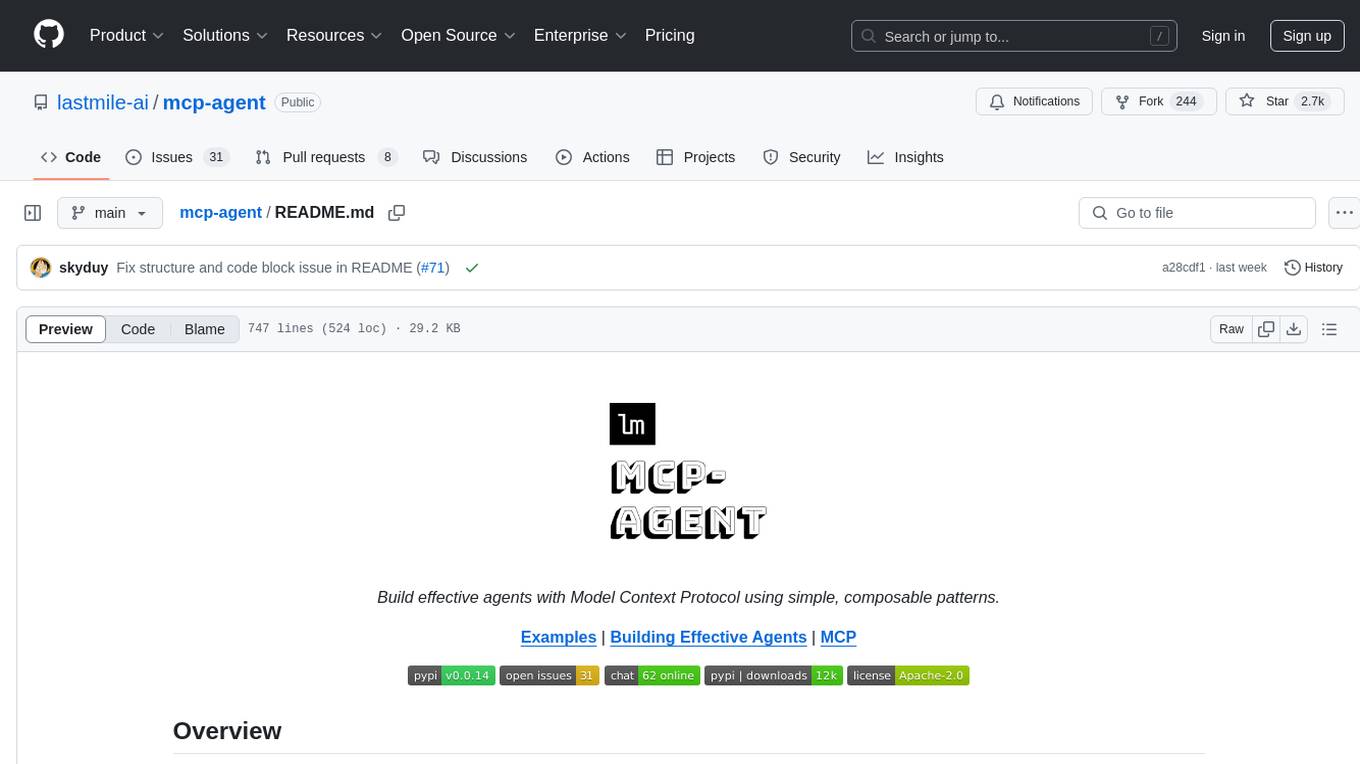
mcp-agent
mcp-agent is a simple, composable framework designed to build agents using the Model Context Protocol. It handles the lifecycle of MCP server connections and implements patterns for building production-ready AI agents in a composable way. The framework also includes OpenAI's Swarm pattern for multi-agent orchestration in a model-agnostic manner, making it the simplest way to build robust agent applications. It is purpose-built for the shared protocol MCP, lightweight, and closer to an agent pattern library than a framework. mcp-agent allows developers to focus on the core business logic of their AI applications by handling mechanics such as server connections, working with LLMs, and supporting external signals like human input.
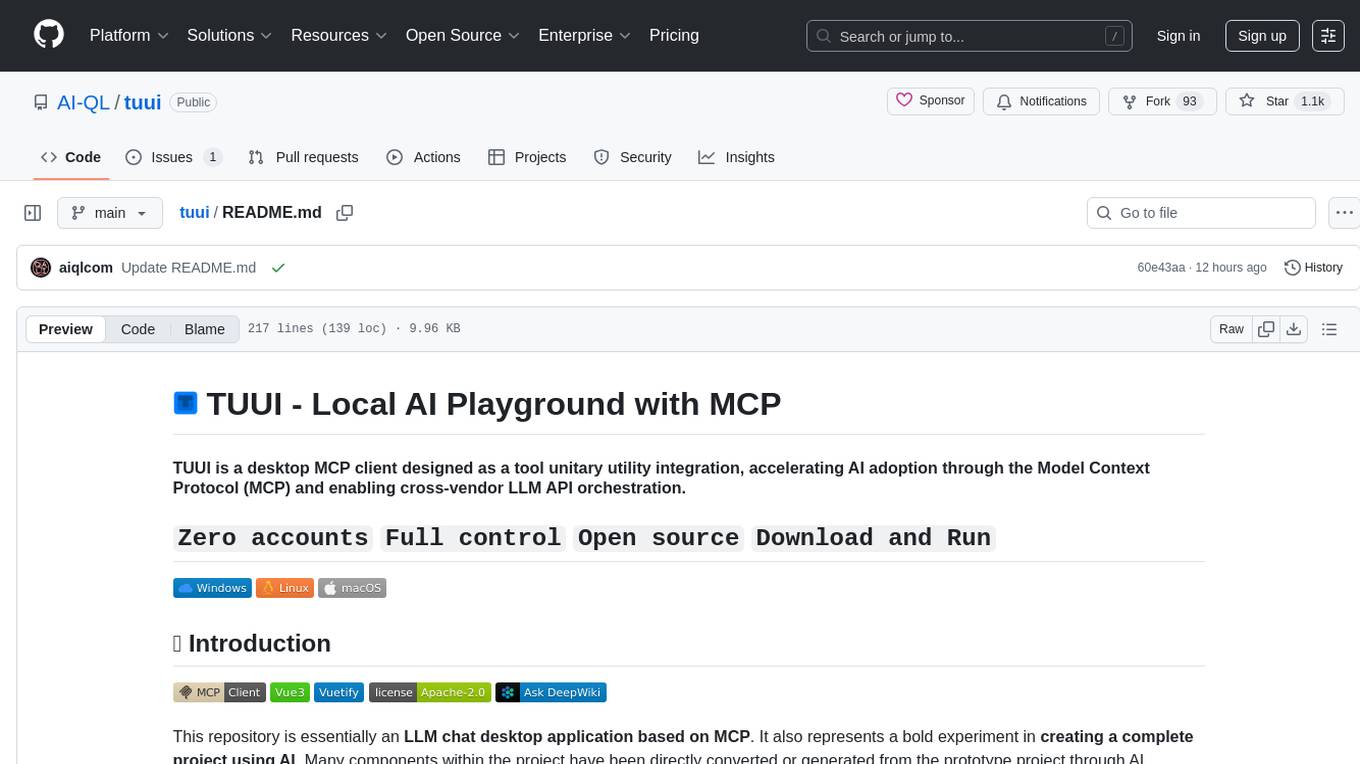
tuui
TUUI is a desktop MCP client designed for accelerating AI adoption through the Model Context Protocol (MCP) and enabling cross-vendor LLM API orchestration. It is an LLM chat desktop application based on MCP, created using AI-generated components with strict syntax checks and naming conventions. The tool integrates AI tools via MCP, orchestrates LLM APIs, supports automated application testing, TypeScript, multilingual, layout management, global state management, and offers quick support through the GitHub community and official documentation.
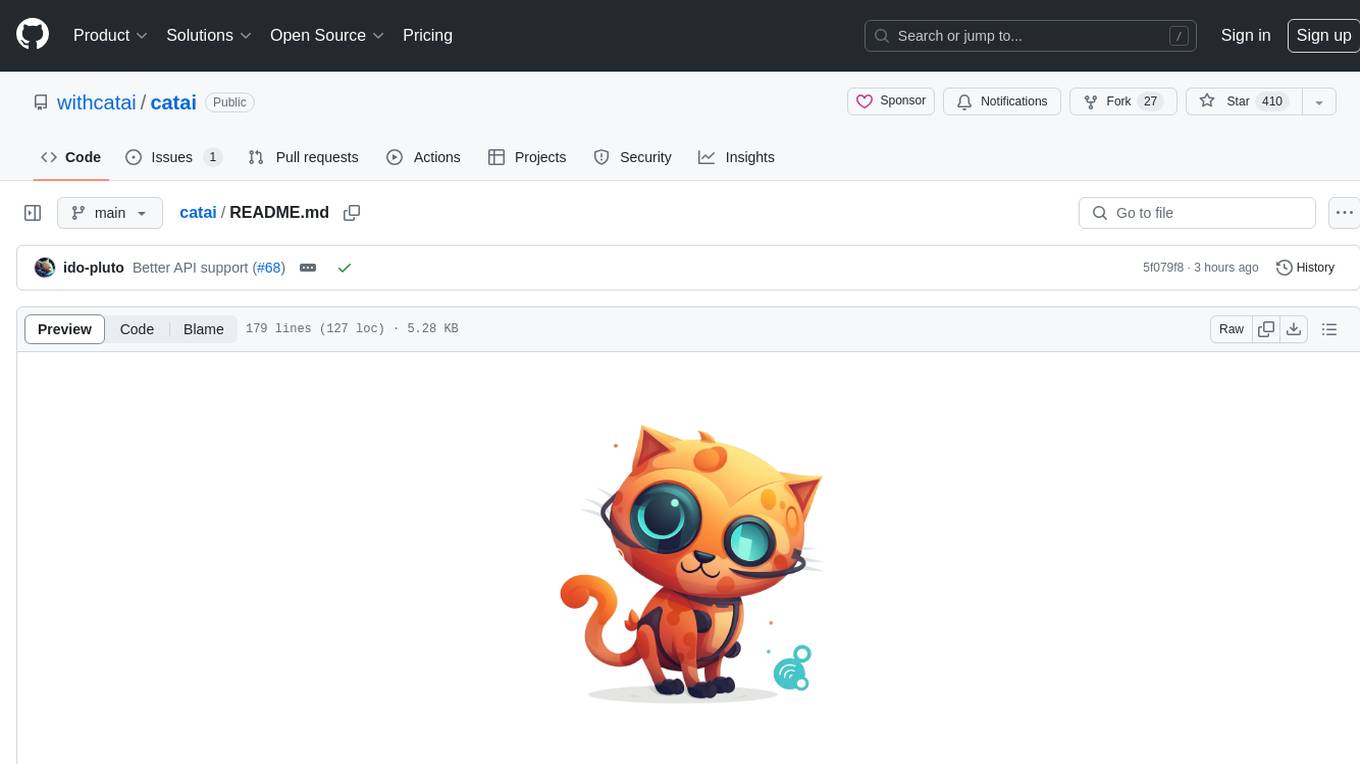
catai
CatAI is a tool that allows users to run GGUF models on their computer with a chat UI. It serves as a local AI assistant inspired by Node-Llama-Cpp and Llama.cpp. The tool provides features such as auto-detecting programming language, showing original messages by clicking on user icons, real-time text streaming, and fast model downloads. Users can interact with the tool through a CLI that supports commands for installing, listing, setting, serving, updating, and removing models. CatAI is cross-platform and supports Windows, Linux, and Mac. It utilizes node-llama-cpp and offers a simple API for asking model questions. Additionally, developers can integrate the tool with node-llama-cpp@beta for model management and chatting. The configuration can be edited via the web UI, and contributions to the project are welcome. The tool is licensed under Llama.cpp's license.
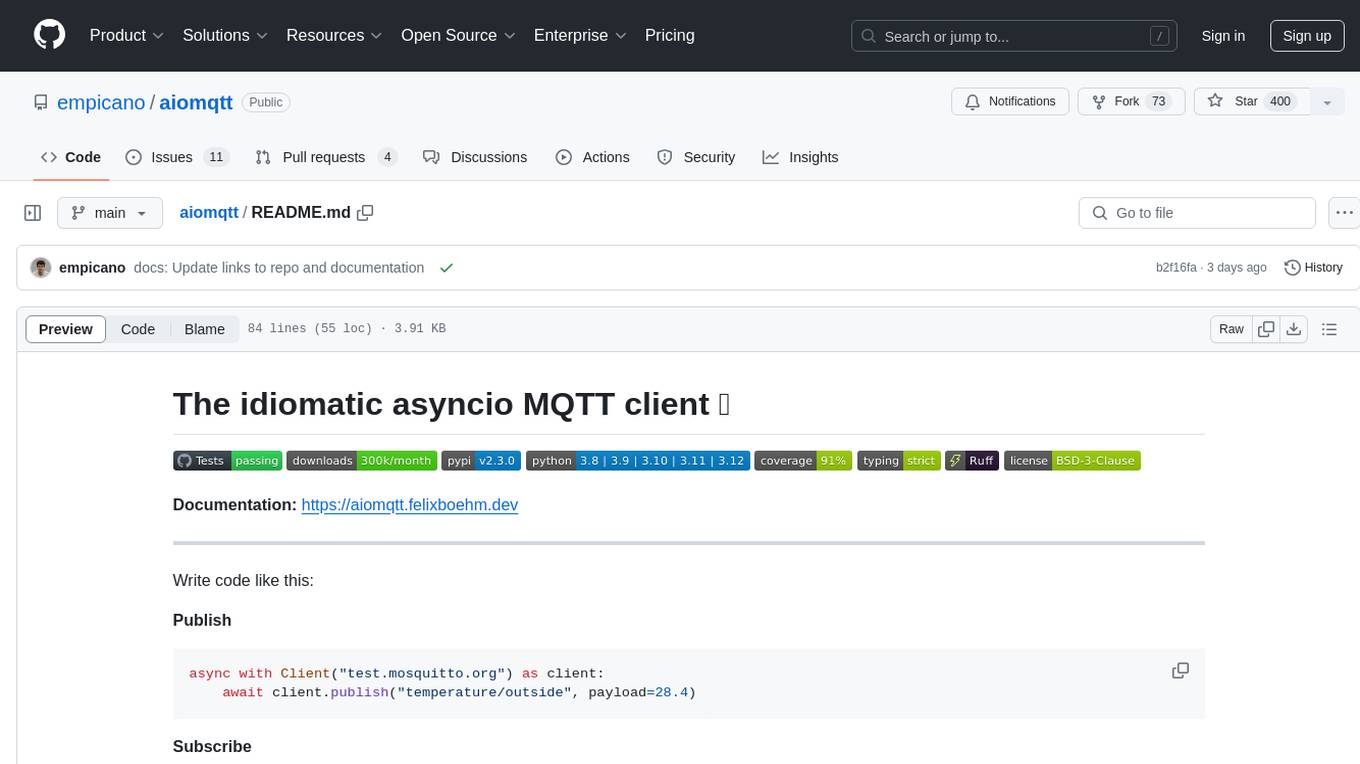
aiomqtt
aiomqtt is an idiomatic asyncio MQTT client that allows users to interact with MQTT brokers using asyncio in Python. It eliminates the need for callbacks and return codes, providing a more streamlined experience. The tool supports MQTT versions 5.0, 3.1.1, and 3.1, and offers graceful disconnection handling. It is fully type-hinted, making it easier to work with. Users can publish and subscribe to MQTT topics with ease, making it a versatile tool for MQTT communication in Python.

semantic-kernel
Semantic Kernel is an SDK that integrates Large Language Models (LLMs) like OpenAI, Azure OpenAI, and Hugging Face with conventional programming languages like C#, Python, and Java. Semantic Kernel achieves this by allowing you to define plugins that can be chained together in just a few lines of code. What makes Semantic Kernel _special_ , however, is its ability to _automatically_ orchestrate plugins with AI. With Semantic Kernel planners, you can ask an LLM to generate a plan that achieves a user's unique goal. Afterwards, Semantic Kernel will execute the plan for the user.

crawl4ai
Crawl4AI is a powerful and free web crawling service that extracts valuable data from websites and provides LLM-friendly output formats. It supports crawling multiple URLs simultaneously, replaces media tags with ALT, and is completely free to use and open-source. Users can integrate Crawl4AI into Python projects as a library or run it as a standalone local server. The tool allows users to crawl and extract data from specified URLs using different providers and models, with options to include raw HTML content, force fresh crawls, and extract meaningful text blocks. Configuration settings can be adjusted in the `crawler/config.py` file to customize providers, API keys, chunk processing, and word thresholds. Contributions to Crawl4AI are welcome from the open-source community to enhance its value for AI enthusiasts and developers.
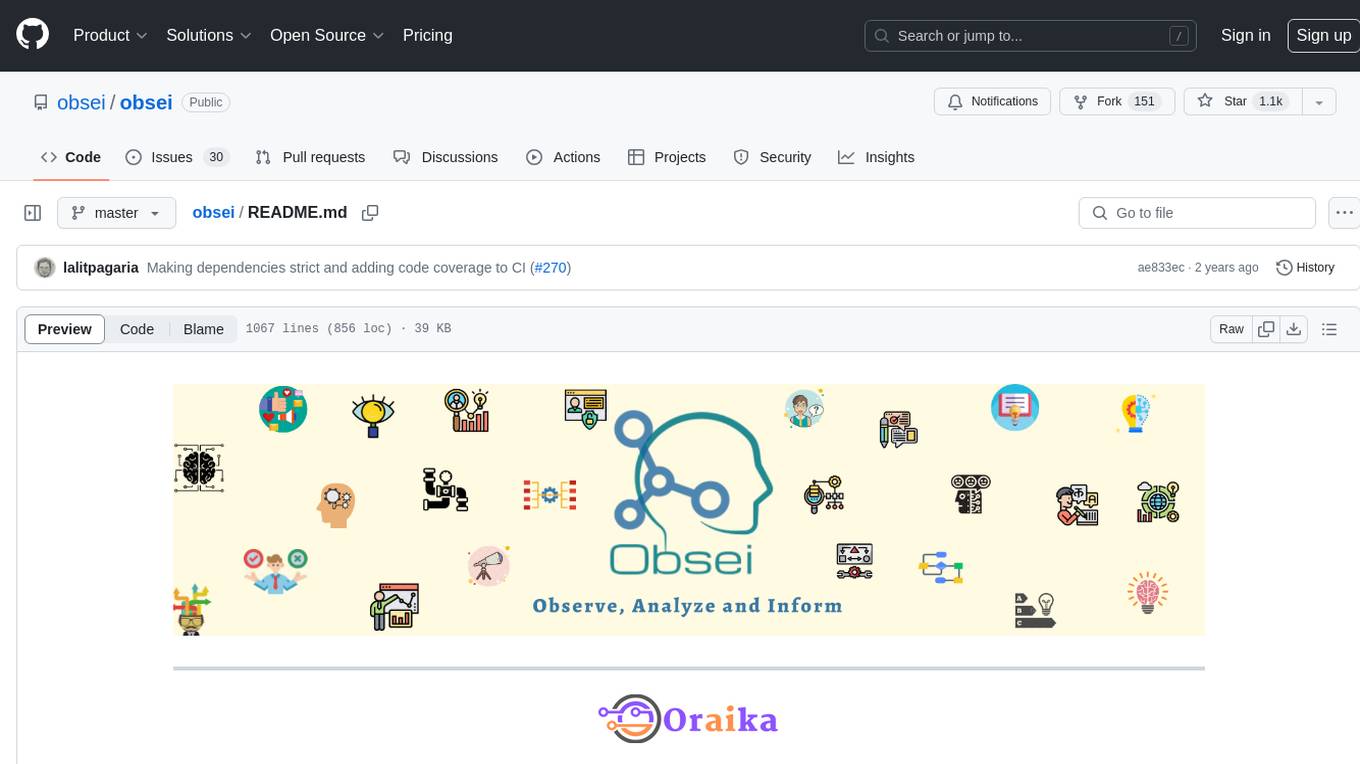
obsei
Obsei is an open-source, low-code, AI powered automation tool that consists of an Observer to collect unstructured data from various sources, an Analyzer to analyze the collected data with various AI tasks, and an Informer to send analyzed data to various destinations. The tool is suitable for scheduled jobs or serverless applications as all Observers can store their state in databases. Obsei is still in alpha stage, so caution is advised when using it in production. The tool can be used for social listening, alerting/notification, automatic customer issue creation, extraction of deeper insights from feedbacks, market research, dataset creation for various AI tasks, and more based on creativity.
For similar tasks

aimeos-laravel
Aimeos Laravel is a professional, full-featured, and ultra-fast Laravel ecommerce package that can be easily integrated into existing Laravel applications. It offers a wide range of features including multi-vendor, multi-channel, and multi-warehouse support, fast performance, support for various product types, subscriptions with recurring payments, multiple payment gateways, full RTL support, flexible pricing options, admin backend, REST and GraphQL APIs, modular structure, SEO optimization, multi-language support, AI-based text translation, mobile optimization, and high-quality source code. The package is highly configurable and extensible, making it suitable for e-commerce SaaS solutions, marketplaces, and online shops with millions of vendors.
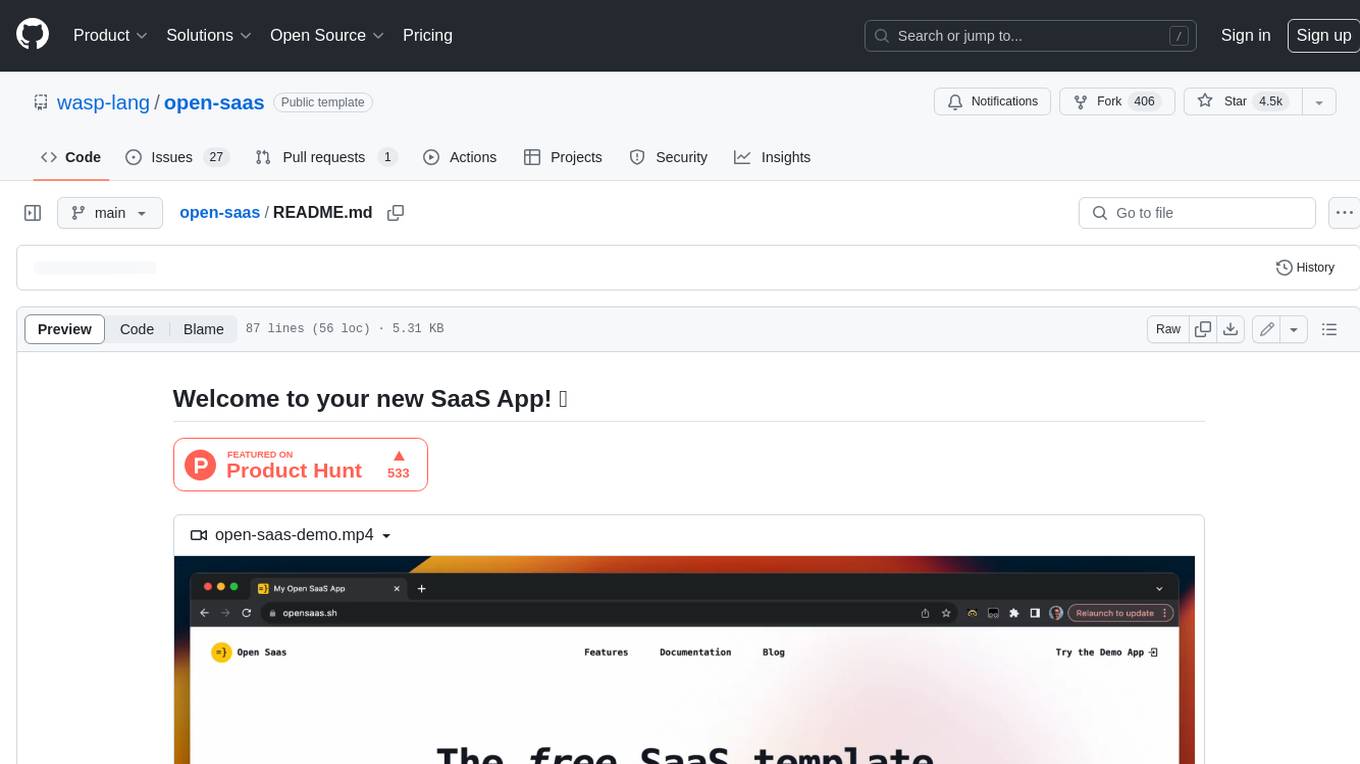
open-saas
Open SaaS is a free and open-source React and Node.js template for building SaaS applications. It comes with a variety of features out of the box, including authentication, payments, analytics, and more. Open SaaS is built on top of the Wasp framework, which provides a number of features to make it easy to build SaaS applications, such as full-stack authentication, end-to-end type safety, jobs, and one-command deploy.
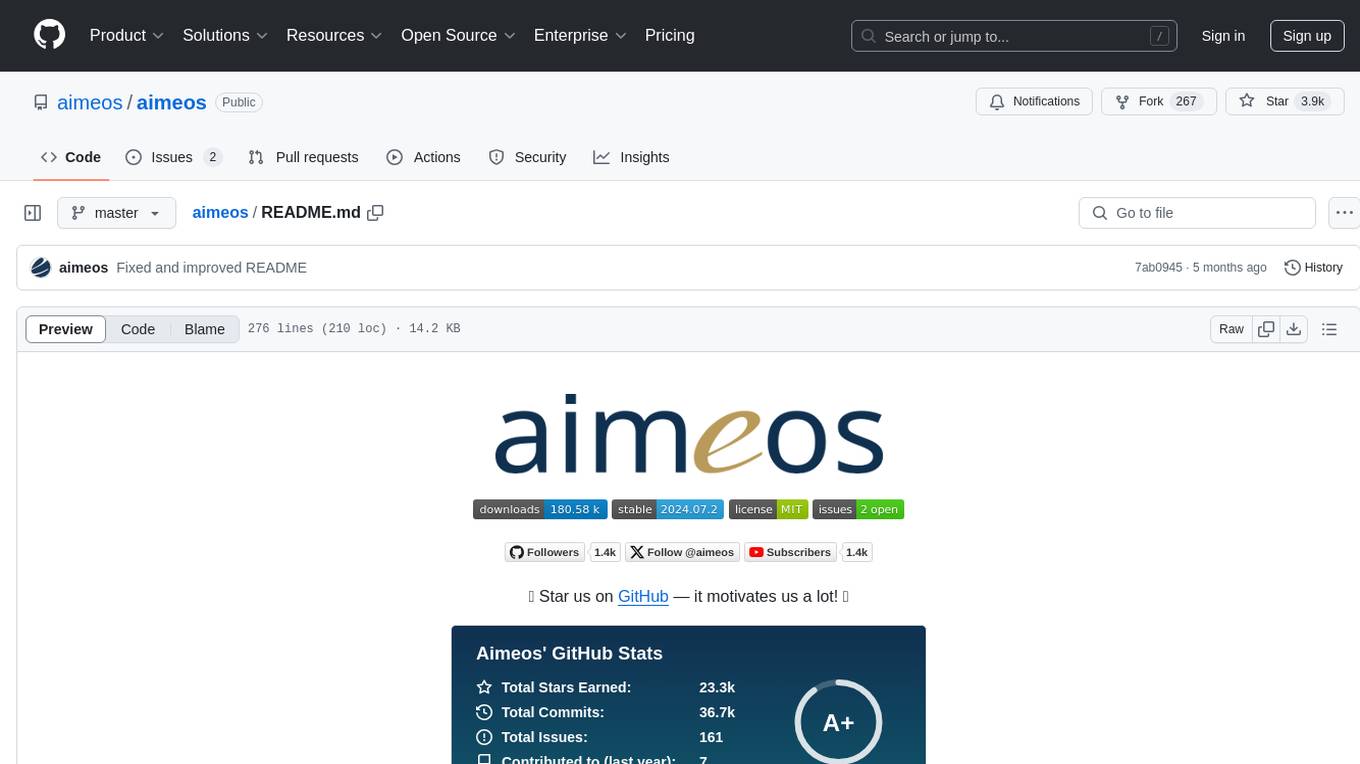
aimeos
Aimeos is a full-featured e-commerce platform that is ultra-fast, cloud-native, and API-first. It offers a wide range of features including JSON REST API, GraphQL API, multi-vendor support, various product types, subscriptions, multiple payment gateways, admin backend, modular structure, SEO optimization, multi-language support, AI-based text translation, mobile optimization, and high-quality source code. It is highly configurable and extensible, making it suitable for e-commerce SaaS solutions, marketplaces, and various cloud environments. Aimeos is designed for scalability, security, and performance, catering to a diverse range of e-commerce needs.
For similar jobs

aimeos-laravel
Aimeos Laravel is a professional, full-featured, and ultra-fast Laravel ecommerce package that can be easily integrated into existing Laravel applications. It offers a wide range of features including multi-vendor, multi-channel, and multi-warehouse support, fast performance, support for various product types, subscriptions with recurring payments, multiple payment gateways, full RTL support, flexible pricing options, admin backend, REST and GraphQL APIs, modular structure, SEO optimization, multi-language support, AI-based text translation, mobile optimization, and high-quality source code. The package is highly configurable and extensible, making it suitable for e-commerce SaaS solutions, marketplaces, and online shops with millions of vendors.
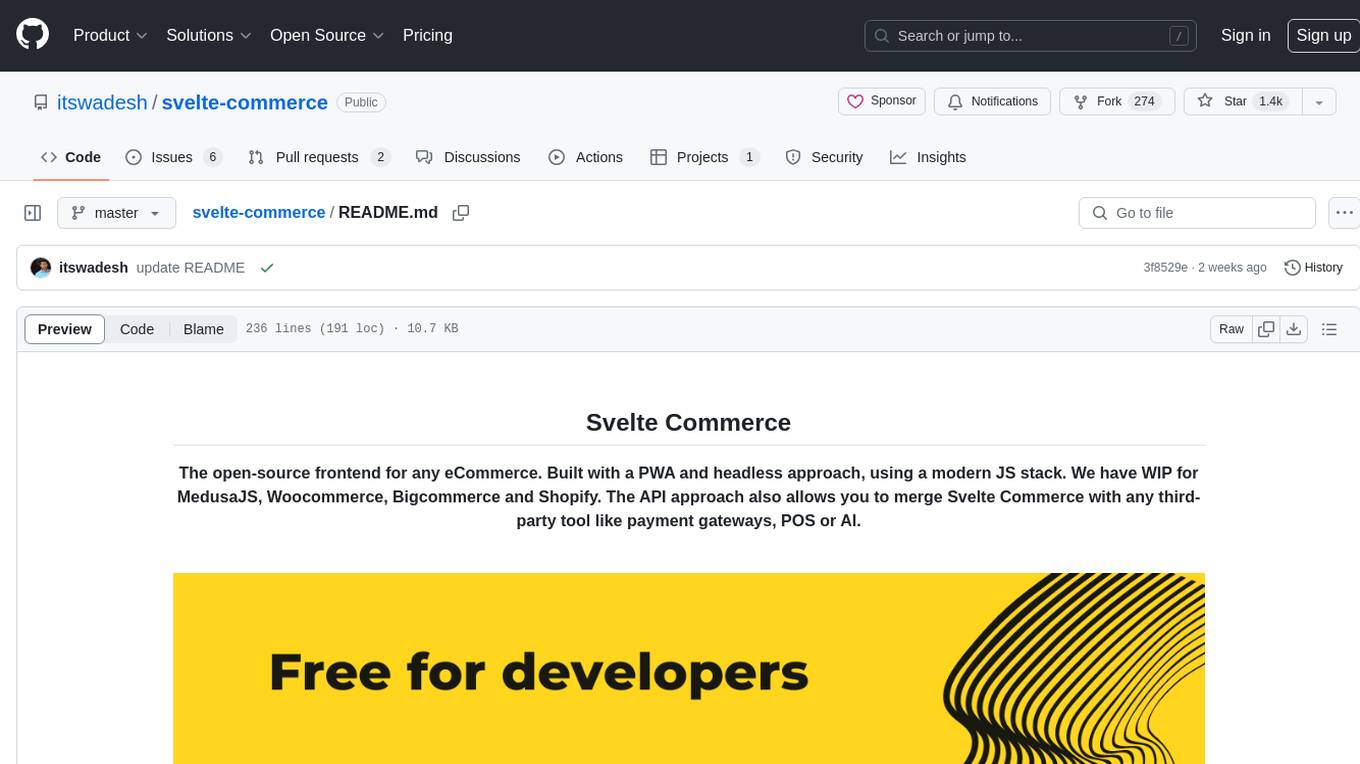
svelte-commerce
Svelte Commerce is an open-source frontend for eCommerce, utilizing a PWA and headless approach with a modern JS stack. It supports integration with various eCommerce backends like MedusaJS, Woocommerce, Bigcommerce, and Shopify. The API flexibility allows seamless connection with third-party tools such as payment gateways, POS systems, and AI services. Svelte Commerce offers essential eCommerce features, is both SSR and SPA, superfast, and free to download and modify. Users can easily deploy it on Netlify or Vercel with zero configuration. The tool provides features like headless commerce, authentication, cart & checkout, TailwindCSS styling, server-side rendering, proxy + API integration, animations, lazy loading, search functionality, faceted filters, and more.
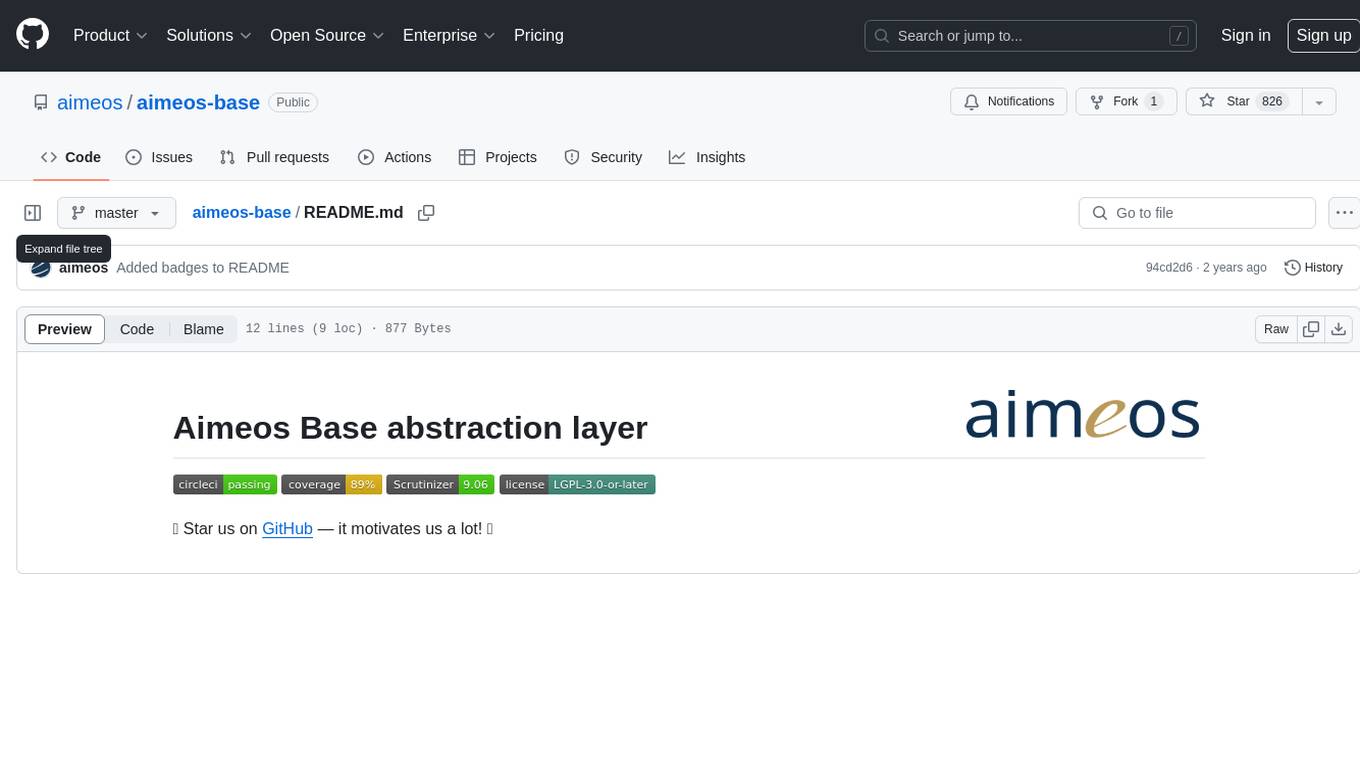
aimeos-base
Aimeos Base abstraction layer is a tool designed to provide a solid foundation for building e-commerce applications. It offers a comprehensive set of functionalities and features that simplify the development process and enhance the performance of online stores. The abstraction layer abstracts common e-commerce functionalities, such as product management, order processing, and customer management, allowing developers to focus on business logic implementation rather than low-level technical details. With a strong emphasis on modularity and extensibility, Aimeos Base enables developers to create scalable and customizable e-commerce solutions that meet specific business requirements. The tool is well-documented and actively maintained by the Aimeos community, ensuring reliability and continuous improvement.

aimeos
Aimeos is a full-featured e-commerce platform that is ultra-fast, cloud-native, and API-first. It offers a wide range of features including JSON REST API, GraphQL API, multi-vendor support, various product types, subscriptions, multiple payment gateways, admin backend, modular structure, SEO optimization, multi-language support, AI-based text translation, mobile optimization, and high-quality source code. It is highly configurable and extensible, making it suitable for e-commerce SaaS solutions, marketplaces, and various cloud environments. Aimeos is designed for scalability, security, and performance, catering to a diverse range of e-commerce needs.

aimeos-headless
Aimeos headless distribution is an ultra-fast, cloud-native, and API-first headless ecommerce solution for Laravel. It offers a full-featured e-commerce package with features like JSON REST API, GraphQL API, multi-vendor support, subscriptions, block/tier pricing, admin backend, and more. The distribution is highly customizable, extensible, and suitable for multi-tenant e-commerce SaaS solutions. It supports multiple languages, AI-based text translation, and provides secure and high-quality source code. Aimeos is designed for AWS, Google, Azure, and Kubernetes based clouds, and can handle a wide range of products efficiently.
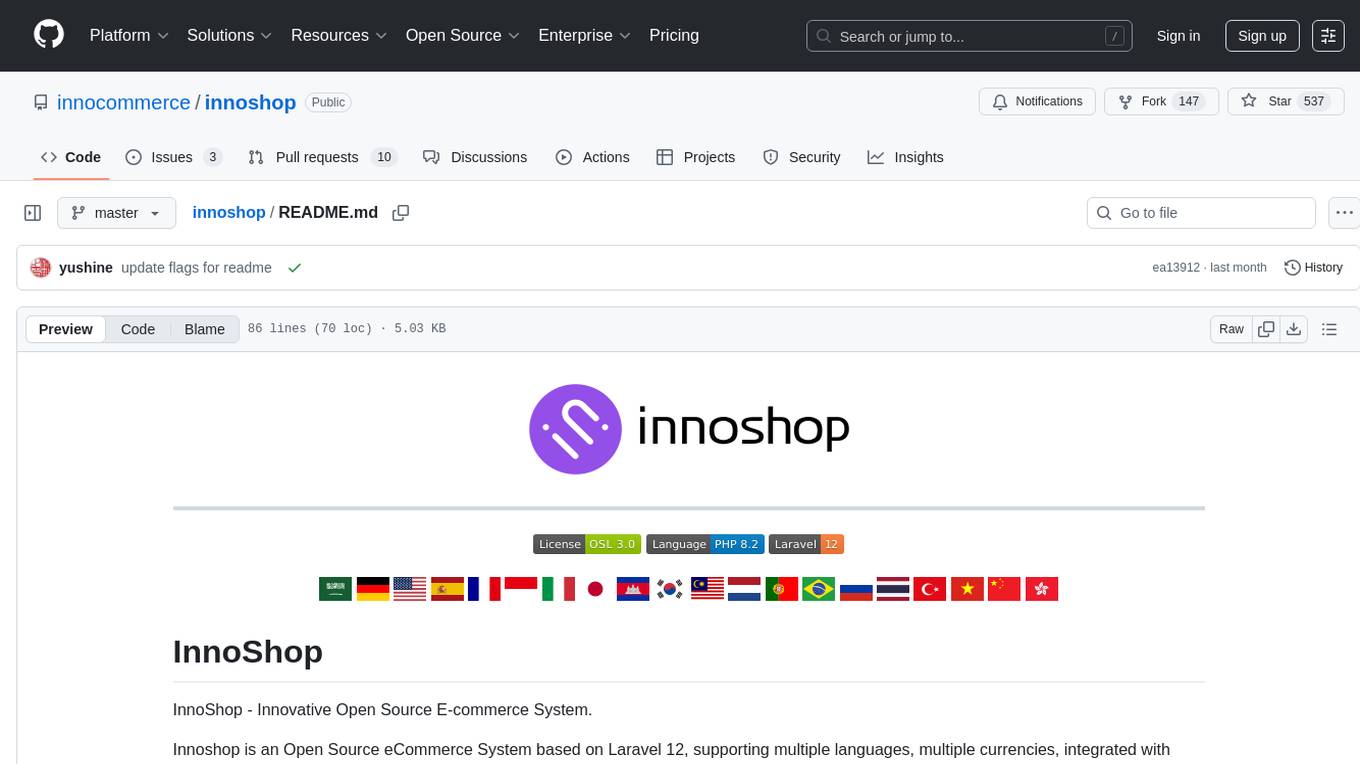
innoshop
InnoShop is an innovative open-source e-commerce system based on Laravel 12. It supports multiple languages, multiple currencies, and is integrated with OpenAI. The system features plugin mechanisms and theme template development for enhanced user experience and system extensibility. It is globally oriented, user-friendly, and based on the latest technology with deep AI integration.
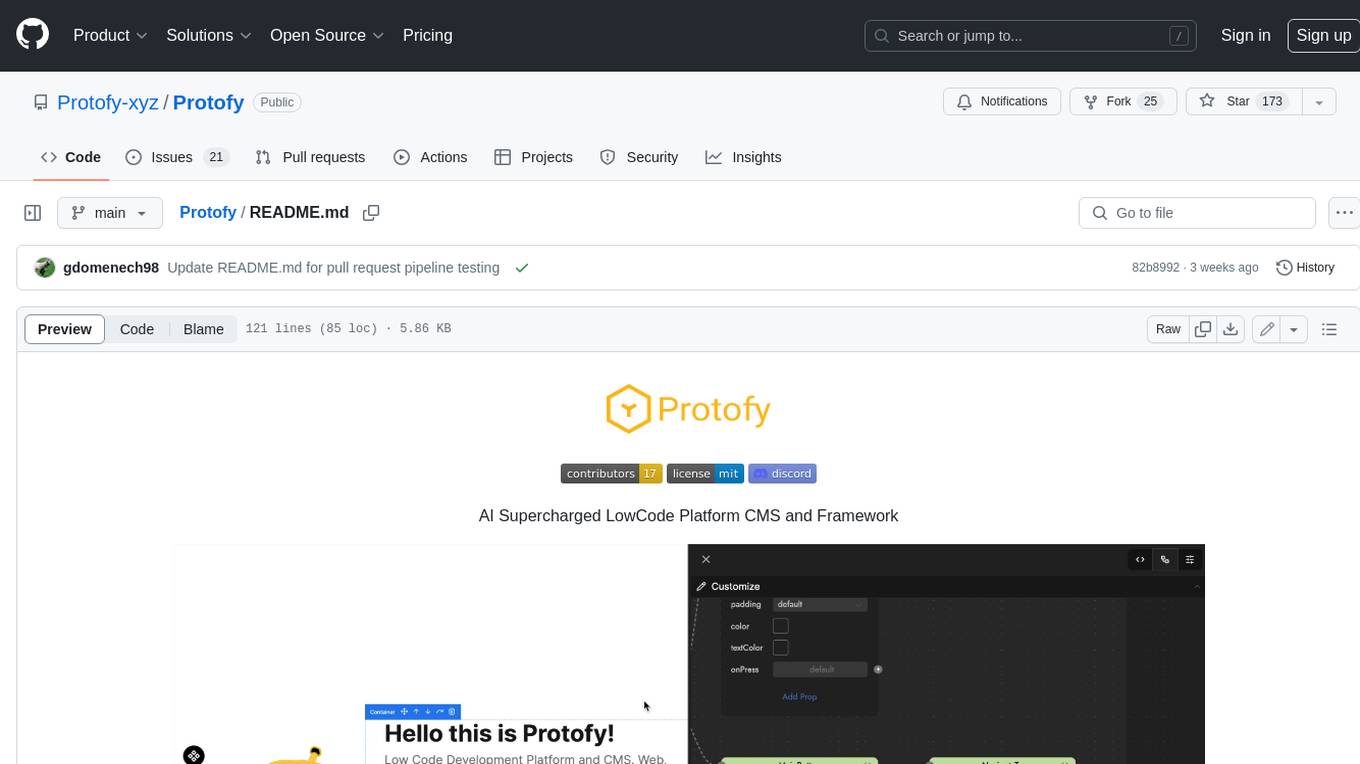
Protofy
Protofy is a full-stack, batteries-included low-code enabled web/app and IoT system with an API system and real-time messaging. It is based on Protofy (protoflow + visualui + protolib + protodevices) + Expo + Next.js + Tamagui + Solito + Express + Aedes + Redbird + Many other amazing packages. Protofy can be used to fast prototype Apps, webs, IoT systems, automations, or APIs. It is a ultra-extensible CMS with supercharged capabilities, mobile support, and IoT support (esp32 thanks to esphome).
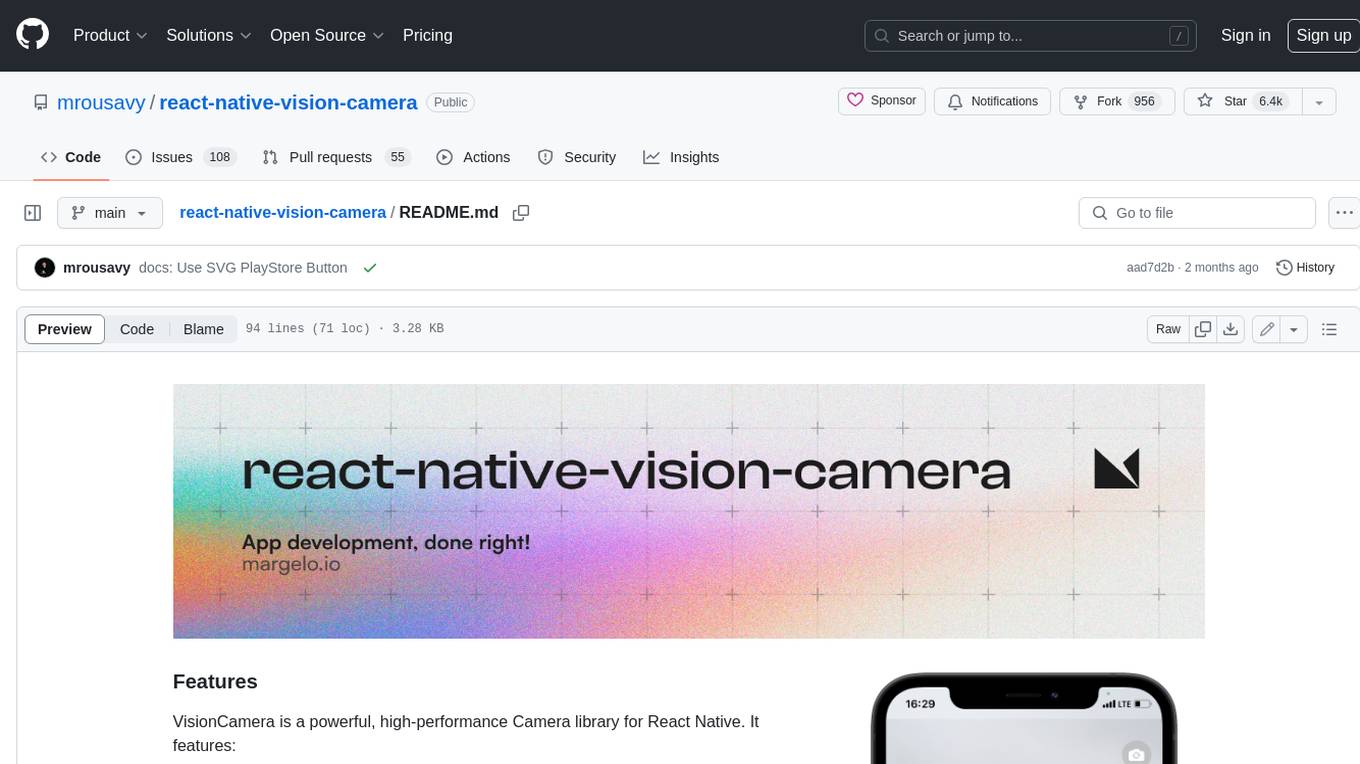
react-native-vision-camera
VisionCamera is a powerful, high-performance Camera library for React Native. It features Photo and Video capture, QR/Barcode scanner, Customizable devices and multi-cameras ("fish-eye" zoom), Customizable resolutions and aspect-ratios (4k/8k images), Customizable FPS (30..240 FPS), Frame Processors (JS worklets to run facial recognition, AI object detection, realtime video chats, ...), Smooth zooming (Reanimated), Fast pause and resume, HDR & Night modes, Custom C++/GPU accelerated video pipeline (OpenGL).

